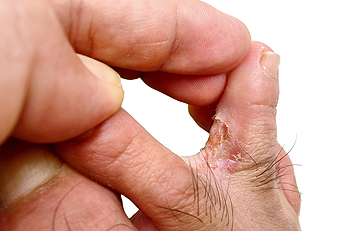
Athlete’s foot, or tinea pedis, is a contagious fungal infection that affects the skin on the feet, commonly starting between the toes. It thrives in warm, moist environments like locker rooms, showers, and swimming pools. Symptoms can include itching, burning, peeling skin, and sometimes blisters. Preventing athlete’s foot involves maintaining good foot hygiene, such as keeping feet clean and dry, especially between the toes. Wearing moisture-wicking socks and breathable shoes helps reduce moisture buildup. Avoiding walking barefoot in public places and using antifungal powders or sprays can further prevent infection. Additionally, regularly changing socks and shoes and disinfecting them can also help. Athlete’s foot can be uncomfortable and unsightly. If you have been afflicted with this condition, it is suggested that you consult a podiatrist who can successfully treat athlete’s foot, which often includes prescribed medication.
Athlete’s Foot
Athlete’s foot is often an uncomfortable condition to experience. Thankfully, podiatrists specialize in treating athlete’s foot and offer the best treatment options. If you have any questions about athlete’s foot, consult with Howard Abramsohn, DPM from Ambulatory Foot and Ankle Associates, LLC. Our doctor will assess your condition and provide you with quality treatment.
What Is Athlete’s Foot?
Tinea pedis, more commonly known as athlete’s foot, is a non-serious and common fungal infection of the foot. Athlete’s foot is contagious and can be contracted by touching someone who has it or infected surfaces. The most common places contaminated by it are public showers, locker rooms, and swimming pools. Once contracted, it grows on feet that are left inside moist, dark, and warm shoes and socks.
Prevention
The most effective ways to prevent athlete’s foot include:
- Thoroughly washing and drying feet
- Avoid going barefoot in locker rooms and public showers
- Using shower shoes in public showers
- Wearing socks that allow the feet to breathe
- Changing socks and shoes frequently if you sweat a lot
Symptoms
Athlete’s foot initially occurs as a rash between the toes. However, if left undiagnosed, it can spread to the sides and bottom of the feet, toenails, and if touched by hand, the hands themselves. Symptoms include:
- Redness
- Burning
- Itching
- Scaly and peeling skin
Diagnosis and Treatment
Diagnosis is quick and easy. Skin samples will be taken and either viewed under a microscope or sent to a lab for testing. Sometimes, a podiatrist can diagnose it based on simply looking at it. Once confirmed, treatment options include oral and topical antifungal medications.
If you have any questions, please feel free to contact our office located in Mt Laurel Township, NJ . We offer the newest diagnostic and treatment technologies for all your foot care needs.
